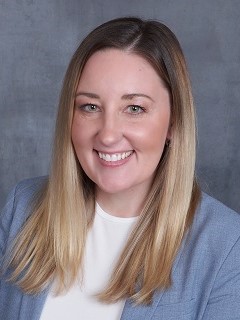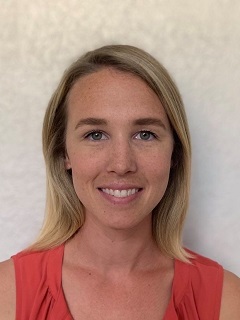Transcript continued
Amanda:
Sure. So as you mentioned, I’m a global mobility leader for a very large private global organization and I’m based outside of Chicago. So in my role today, I lead a global team of 24 mobility professionals. So there’s 25 of us, a very large team, but the main focus of my role is to develop the global mobility strategy and roadmap for the organization. So, a lot of what I do is understanding what’s happening in the industry, learning from peers, understanding the technology landscapes, so like many others, there’s a really high focus on automation and AI. And then also, for our internal customers, what do they want, what do they need and how do we align to their business strategy? But I would say the most important job that I have is people leadership. So I get to work across my team to help them with career goals development, different opportunities, so that’s been very gratifying.
But as far as my journey, so kind of to paint the picture, if we go way back to 2011, I graduated from college a few years prior and moved to the wonderful city of Chicago. I was working at a law firm, not sure what I wanted to do, and I was exploring career paths, hanging out with friends, all the good things we do in our early 20s, and I will say I did not intentionally make a career move to a big four accounting firm, but I sort of fell into it, where I started doing partnership work and then ended up in mobility tax.
And so around that time, I met my spouse, or soon to be spouse I guess, was dating him at the time, and he was an active duty Marine. And at the time, he had received orders to work at a reserve unit in downtown Chicago. So, we started dating and it was very similar to anyone else kind of doing a 9 to 5, or in my case, maybe a lot more than that. But going to work and coming home and so I didn’t really understand at the time what the concept of military life was really like. At that point, when we started talking about marriage, he’d been in for 13 years with plans to do at least 20. So, once we were married, then started the conversation around orders and potentially moving.
So as a planner, my anxiety immediately spiked, and I was also very focused on my own career and was worried about the impact of a move and what that would do to my career plans. But thankfully at the time, so as I mentioned, I was in a big four accounting firm environment, and I was in a role that allowed for some location flexibility. And so finally orders came, and thankfully, I was very fortunate that it was to the beautiful city of San Diego. I was able to shut down my laptop in Chicago and then move to the San Diego office. I will say that I was very fortunate in that situation because there were a lot of other military spouses that I met once I moved to San Diego that were not as fortunate. So I was able to keep my same role. And then I was able to really build connections quickly in that office.
However, as the years went on and we were in San Diego, I continued to feel this anxiety around we know more orders are going to come, so if you recall 13 years in, we know that there was going to be at least one more move and what would that do to my career.
And this is back in 2012 to 2016, so remote working wasn’t as common as it is today. And so of course at that 17-year mark in my spouse’s career, he was sent to Okinawa, Japan unaccompanied. And at the time, we had two daughters, one and three, and we made the decision that I would move back to Massachusetts where I was originally from and he would go to Okinawa. And that was a point in my career where I had been very fortunate up until this point. But I really struggled with trying to balance a career and caring for the kids.
And just a short story, so I remember I was on a call with an assignee in Italy. And I was sitting in my closet and there was chaos all around me. There was construction in the house next door and he said to me at the end of that call, well, Amanda you’re so professional, and I remember thinking if you only knew what I’m doing right now. But it was at that time where I made a choice and I left the firm for a new opportunity. And at that organization, I thankfully was able to continue to build a career in a space that I loved, so I continued to stay in mobility tax and I was able to volunteer with an internal veteran group. And we did a lot of volunteer projects, raised money for different causes, did a lot of road races, so I’m a passionate runner, so that fit in really well. And I was able to combine my corporate career with giving back to the military community, which was great.
After a few years, I moved to the organization that I’m in today to pursue an elevated role and I’m really happy. I’ve had a lot of career growth since I’ve been here and now I’m even talking to my leader about expanded responsibilities. I will say that I do continue to give back to the military community, so just a little bit of a plug. This year I’m running the Chicago Marathon for the organization Home Base. So if you’re not familiar with them, they’re a nonprofit that are dedicated to healing the invisible wounds of war for veterans of all eras. So they do things like clinical care, wellness, education, research and it was founded by Massachusetts General Hospital and my all time favorite team, The Boston Red Sox, so for my personal journey, doing really well today, but that being said, there were a lot of challenges.
So, the key takeaways that I would have from my experience are the first thing, depending on where you are in your career and the number of anticipated years in the military, understand any career limitations that may arise from moving locations. So I put my tax hat on. If you want to stay with your current organization, make sure you’re able to work in that new location. So even if you’re a remote employee, and you want to be remote in the new location, really making sure from a corporate tax standpoint and payroll, you’ve checked all the boxes and you’re able to have that location flexibility.
The next thing would be build a strong network to gain support. Have open discussions with your organization around any limitations you may have. I remember at one point sort of dueling travel schedules and having some limitations there, but just providing that transparency. And what I’ve found is people are willing to help if you’re open about that.
And then, if you are unable to continue with the same organization, find industry networking events, reach out on LinkedIn and look for those places where you can really build a network. And I’ll just end with while it can be very challenging to juggle a career and military spouse life, it can be done. And leaning in during the hard times can absolutely pay off. I do recognize that I was fortunate in my path where I did have a lot of opportunity. But if you’re struggling, look for those who are willing to help and be intentional. And I will just end with I wish I could have spent more time looking at each situation as a new opportunity rather than having so much anxiety.
Joel:
Yes, thanks for sharing, Amanda. And like you, I will be participating in run to Home Base, probably won’t be running as fast as you, but I will be running nonetheless. I completely agree with your comment about being intentional about building networks, both at your existing organization and in your new professional communities. I think that’s important for everyone, but it’s of particular importance when you don’t know when your next move is going to be. So thank you so much.
We’re going to switch gears a little bit and hear from Katie who is an active military spouse today. Hey, Katie, I would love to hear from you as I’m sure this is all very fresh in your head, just on your experience of what being a military spouse looks like in 2024.
Kaitlyn:
Yes, thank you very much, I appreciate the opportunity to speak today, but also the fact that this topic is of interest and is being talked about. My husband is active duty right now. I’ve been a military spouse for about 12 years. The last three have been working with KPMG while living in Florida, but now I am currently located in Charleston, South Carolina.
One of the positives of COVID or post-COVID life is the amount of flexibility companies are giving to their employees, so I have been very fortunate to be hired on as a remote employee and then when we did new orders to Charleston, I did have to have those conversations with KPGM about potential locations and whether or not I could continue my work. And like Amanda said, I was very lucky in the fact that KPMG was flexible in that and I was able to continue on my career path that I was on pre-move.
It’s especially important for families like ours, the military families who move around a lot to have that flexibility because whenever you do move, especially with a young family, everything is new, so having some sort of stability like a person’s job really does help with coping with all of the nuances that come with moving, finding a new school, location, house, all of that. I have three boys ages seven, five and three, so being able to have that one consistent was very important to me.
So as someone who grew up in Texas and then worked in Florida, you can imagine the shock that I received when I received my first paycheck in South Carolina. And it seemed like a portion of my check was gone. So, I knew that there was something called state income tax, but I actually had never really encountered it before. And I think it may be a little bit of a shift of what we’ve been talking about. But thankfully, because I worked for the lovely accounting firm, I was made aware of the Military Spouses Residency Relief Act and that allows military spouses to maintain legal residence in states where they lived before the change of duty station. So I actually am able to claim Texas as my permanent residency and then I do not have to pay that state income tax for South Carolina.
So, becoming a military spouse that’s just one of the challenges with moving with your spouse and your family. But there’s also other challenges in regards to finding jobs, keeping stability. And I think key takeaways with that would be just to ask questions, be informed. Like Amanda says, keep your networking game strong and just using that community around you for the support that you need.
Joel:
Thanks, Katie. I really appreciate you sharing your story. I know it’s all very fresh in your head and I think you had great perspective on how that differs today from Amanda’s situation as she reflects on ten years ago. A lot of the same themes, but I think in the last time, if we think about how much has changed, that’s a great perspective. So I said in the beginning, there was going to be two angles or approaches on how we’re defining support in the context of supporting military spouses at our organizations. So I hope that after hearing from Amanda and Katie, we all continue to challenge ourselves, to continue to be empathetic of those unique challenges that military families at our organizations are faced with.
The second part of the conversation, let’s shift a bit, and we’re going to think through how mobility professionals can use our skill sets to support military families at our organizations and I’ll start by sharing some insights on legislation that are in place to protect military families and you would have heard Katie reference one of them a bit earlier.
So the Service Members Civil Relief Act, known as the SCRA, that was enacted back in 2003 and that was intended to protect service members from establishing domicile in a state solely due to military service. So we put our mobility hats on for a second, I like to think of this in a way as our government tax equalizing our service members. The SCRA prevents them from being worse off from a tax perspective as a result of being in a new state due to military service.
Now the SCRA made a lot of sense, and it made a material impact for our service members, but at that time, so back again, 2003, we’re talking, that protection of the legislation, it didn’t extend to the spouses of service members. So, to their credit in recognizing that this needed to be resolved. Congress passed the Military Spouses Residency Relief Act, known as the MSRRA in 2009. So under the MSRRA, the spouses of service members were now granted that same tax residency protection and further it also prevented the spouse’s income from being considered earned in the nonresident state if the spouse was present in that state solely due to military orders.
So to help digest that a bit, I’m going to make up a completely random fact pattern. Let’s say that an active service member and his spouse Katie are legal residents of Texas, Katie works for a well respected public accounting firm in Texas and Katie’s husband receives permanent change of station orders or known as PCS orders to move to a base in South Carolina. So Katie, her husband, their family, they pack up and move to South Carolina. And Katie continues to work for that public accounting firm while sitting in South Carolina.
And I think it’s important to mention under the MSRRA, in this example, whether Katie continued to work for the same employer, or Katie got a new employer, the result doesn’t change. So I do want to just make that one mention there. Now, as a result of the protection of the MSRRA, Katie will not be subject to income tax in South Carolina on her wages, even though she’s physically sitting there.
Now, we think about the same fact pattern but through the lens of a civilian family, what would happen? Most likely, that move would result in abandoning domicile in Texas, establishing domicile in South Carolina and now that family’s income being subject to South Carolina tax. So really, if you want to boil it down and again, Katie alluded to this experience herself, the difference of being aware of this legislation and not being aware of this legislation could be a difference of seven percent of Katie’s net take home pay. I mean that’s not an immaterial amount of money. So that’s kind of through the employee’s point of view.
If we think about as an organization, we need to be aware of this legislation and make sure that we have payroll processes in place to recognize these nuances and to make sure that payroll appropriately reflects them. And I’ll say something that I’m incredibly proud of at KPMG, our Global Mobility Services practice joined forces with our Veterans Business Resource group and we created a benefit at KPMG for our military spouses by offering them a tax consultation in the year that their PCS orders are granted. So we help them digest that legislation, help them understand what it means for them. And this process has both been very well received and incredibly rewarding and something that our global mobility services practice takes great pride in. Now, if you’re feeling inspired and you want to add military spouse to the spectrum of mobility at your organization, you know where to find me.
So maybe in closing, I hope you found this session informative and helpful in thinking about how you may want to proactively address some of these challenges at your organization. And on future episodes, we’re going to continue to address these top-of-mind issues that are of interest to our listeners. But in the meantime, we’d love to hear from you. If you have thoughts on today’s podcast, if you want to continue the conversation, or if you have ideas for future podcasts, please send us an email at US-taxwatch@KPMG.com. One final thanks to our audience for listening in, big thanks to Amanda and Katie for making the time and take care.






